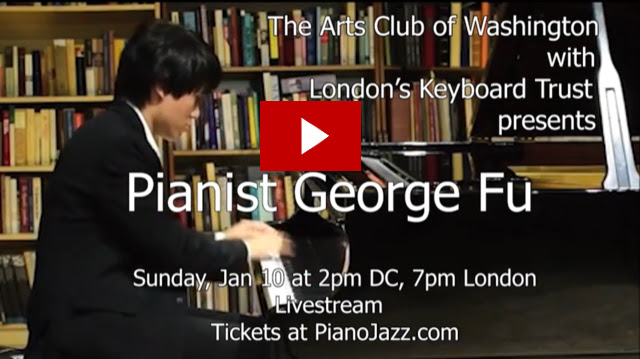
The Arts Club of Washington and London’s Keyboard Trust are pleased to present the brilliant young pianist George X. Fu. The concert will be streamed live from the 12th century St. Mary’s Perivale Church in London.

The Program
J.S. Bach/Sergei Rachmaninov – Gavotte from Violin Partita No. 3 by J.S. Bach
George Xiaoyuan Fu – Transformation on Gigue from Violin Partita No. 2 by J. S. Bach (2020, world premiere)
Franz Schubert – Sonata in C minor, D. 958 Allegro-Adagio-Menuetto,Allegro /Trio-Allegro
Sergei Rachmaninov – Selections from Études-tableaux Op. 39
No. 3 in F# minor
No. 5 in Eb minor
No. 8 in D minor
No. 9 in D major

Extraordinary recital by George Fu streamed live to the Washington Arts Club for the Keyboard Trust from the oasis of St Mary’s Perivale guided by Dr Hugh Mather and his valiant colleagues.
Playing of such delicacy and purity that his phenomenal control of the keyboard was taken for granted as his limpet type fingers carved such wondrous sounds from the keyboard.
The Bach Gavotte in a transcription by Rachmaninov played with the same charm and style that was Kreisler’s.His own transcription too full of the same charm ,if a different language , but both played with such artistry ,fleetness of finger and sumptuous sounds of a different age. George is a serious guy and said he thought he would open his programme with something light and airy.
Followed by Schubert’s C minor Sonata ,the last great trilogy of sonatas written just before Schubert’s untimely death ,was played with such purity and simplicity that it reminded me of Gilels rather than Richter’s more illusive performances.Where Richter’s slow movement was barely audible here it was played today with such simple beautiful whispered but luminous sounds, with a sense of line similar to the Arietta of Beethoven’s op 111.In fact the only other occasion I have heard George was in a performance of Beethoven op 109 where his luminosity and purity of sound have remained with all those that were present at Steinways in the good old days when artists could see and breath the music with the people they were sharing it with.Here there was an imaginary audience worldwide and judging by some of the comments as moved as we all were listening in our own homes.Four Rachmaninov Etudes Tableaux that were astonishing for their poetry as they were for their virtuosity.
Amazingly George arrived at the Royal Academy armed with a degree in economics from Harvard.I am not surprised to learn that he is now a fellow of my old Alma Mater .
It was in the Schubert Sonata that George’s exceptional musical credentials became apparent.An extraordinary sense of colour and architectural control ;an orchestra of ten wonderful players in his hands more the sumptuous golden Philadelphian sound that the bright New York Philharmonic.A remarkable sense of balance that allowed the musical line to sing out unimpeded by the underlying harmonies.There was a haunting magic to his chromatic scales as the opening motif was hinted at in the bass.Maybe something of the animal frenzy of Richter or Serkin was missing but there was a wonderful golden homogeneous sound that allowed us to wonder and be amazed as if listening for the first time to this extraordinary work.The beautiful coda was a revelation in his magical hands.There was an absolute stillness to the Adagio played with a luminosity of sound .A touching simplicity and purity that was truly wondrous.The questioning Scherzo resolved so mellifluously by his extraordinary finger legato that lends such clarity to every detail.The Rondò was played with a buoyancy and a haunting beauty that contrasted so well with the episodes .This was Schubert happy that the dark shadows looming in his life had disappeared for an instant.George has that rare gift of making the music speak so eloquently and the change of colour for Schubert’s unexpected explosion of melody he imbued with such golden sounds allowing it to glow full of wondrous poetry.They talk about Schubert’s sublime length and if music be the food of love as George demonstrated today please let it never stop in these bleak times.

Chinese-American pianist George Xiaoyuan Fu is establishing a reputation as a captivating performer with distinctive intelligence and sensitivity.He has performed as a piano soloist with the National Symphony Orchestra, Baltimore Symphony Orchestra, North Carolina Symphony, Tanglewood Music Center Orchestra, and the Curtis Symphony Orchestra, and collaborated with conductors Michael Tilson Thomas, Stefan Asbury, Kensho Watanabe, Vinay Parameswaran, and Jonathan Berman. He has appeared at the Kennedy Center, Carnegie Hall, Wigmore Hall, and Seiji Ozawa Hall at Tanglewood. He has been heard on BBC Radio 3, National Public Radio, and On Stage At Curtis Institute.
George is an active composer and performer of contemporary music, having collaborated with composers Krzysztof Penderecki, Harrison Birtwistle, George Lewis, Unsuk Chin, Tansy Davies, Phil Cashian, Matthew Aucoin, and Freya Waley-Cohen.
A Harvard University grad, George studied at the Curtis Institute of Music under Jonathan Biss and Meng-Chieh Liu, and then at the Royal Academy of Music under Christopher Elton and Joanna MacGregor. He has also worked intensively with Pierre-Laurent Aimard, specifically on the music of Messiaen and Debussy. George is currently the Hodgson Piano Fellow of the Royal Academy of Music.
Mr. Fu has been selected by London’s Keyboard Trust for their artist development program. The Keyboard Trust celebrates their 30th anniversary in 2021, and supports the most gifted young pianists on stages in London, New York, Mexico, Berlin, Rome, Washington, DC, and other music capitals. The Trust has presented more than 250 international pianists, historic-keyboard players, and organists in nearly 1000 concerts. With such notable musicians as Evgeny Kissin, Alfred Brendel, and the late Claudio Abbado among its trustees, this formula has proved its worth. www.keyboardtrust.org


Una risposta a "George Fu live stream for the Keyboard Trust from St Mary’s Perivale to Washington Arts Club"